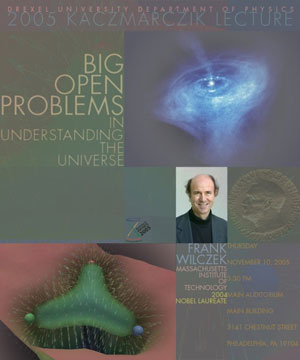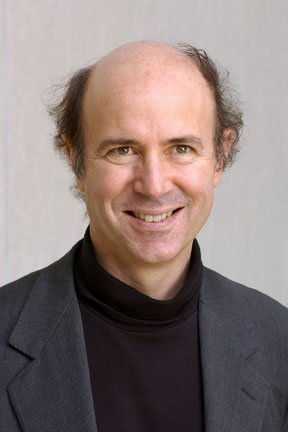11th Kaczmarczik Lecture
"Big Open Problems in Understanding the Universe"
Frank Wilczek, PhD
Center for Theoretical Physics, MIT
2004 Nobel Laureate
Thursday, November 10, 2005
3:30 p.m.
Main Building Auditorium
3141 Chestnut Street
Philadelphia, PA 19104
 In modern physics, we have learned to formulate the laws for the behavior of matter, and for the large-scale organization of matter, in terms of standard models incorporating a very few parameters. We have no compelling theory for why the values of these parameters are what they are, yet small changes in those values would appear to have catastrophic consequences for the possible emergence of complex structures and ultimately intelligent life. Recent developments in inflationary cosmology, axion physics, and string theory are bringing questions of this sort to the top of the agenda of theoretical physics. Are fundamental parameters of physics determined, in whole or in part, by selecting, among many existing candidate universes, only those that can be observed? I'll describe the crucial issues in a simple but concrete way.
In modern physics, we have learned to formulate the laws for the behavior of matter, and for the large-scale organization of matter, in terms of standard models incorporating a very few parameters. We have no compelling theory for why the values of these parameters are what they are, yet small changes in those values would appear to have catastrophic consequences for the possible emergence of complex structures and ultimately intelligent life. Recent developments in inflationary cosmology, axion physics, and string theory are bringing questions of this sort to the top of the agenda of theoretical physics. Are fundamental parameters of physics determined, in whole or in part, by selecting, among many existing candidate universes, only those that can be observed? I'll describe the crucial issues in a simple but concrete way.
 Professor Frank Wilczek is considered one of the world's most eminent theoretical physicists. He is known, among other things, for the discovery of asymptotic freedom, the development of quantum chromodynamics, the invention of axions, and the discovery and exploitation of new forms of quantum statistics (anyons). When only 21 years old and a graduate student at Princeton University, in work with David Gross he defined the properties of color gluons, which hold atomic nuclei together.
Professor Frank Wilczek is considered one of the world's most eminent theoretical physicists. He is known, among other things, for the discovery of asymptotic freedom, the development of quantum chromodynamics, the invention of axions, and the discovery and exploitation of new forms of quantum statistics (anyons). When only 21 years old and a graduate student at Princeton University, in work with David Gross he defined the properties of color gluons, which hold atomic nuclei together.
Professor Wilczek received his BS degree from the University of Chicago and his PhD from Princeton University. He taught at Princeton from 1974-1981. During the period 1981-88, he was the Chancellor Robert Huttenback Professor of Physics at the University of California at Santa Barbara, and the first permanent member of the National Science Foundation's Institute for Theoretical Physics. In the fall of 2000, he moved from the Institute for Advanced Study, where he was the J.R. Oppenheimer Professor, to the Massachusetts Institute of Technology, where he is the Herman Feshbach Professor of Physics. Since 2002, he has been an Adjunct Professor in the Centro de Estudios Cientificos of Valdivia, Chile.
High School Open House Program:
12:30 - 1:00 p.m. Main Building Auditorium
1:00 - 3:00 p.m. Department of Physics Open House
Brief presentations on Biophysics, Astrophysics, Computational Physics, Condensed Matter, Nonlinear Dynamics, Particle Physics, etc. An excellent opportunity for high school students to visit our laboratories and meet in person with our internationally recognized researchers.
3:00 - 3:30 p.m. Reception
About the Kaczmarczik Lecture
Paul Kaczmarczik began his career as a Professor of Physics at Drexel University in 1953. A key player in building the Physics and Atmospheric Science Department, he made important contributions to teaching at Drexel University during his many years of service. Well-liked by both his colleagues and his students, Professor Kaczmarczik became Professor Emeritus in 1989. The Kaczmarczik Lecture Series was established in 1995 in honor of Professor Kaczmarczik. It brings to Drexel outstanding scientists to present lectures on topics at the cutting edge of Physics research.